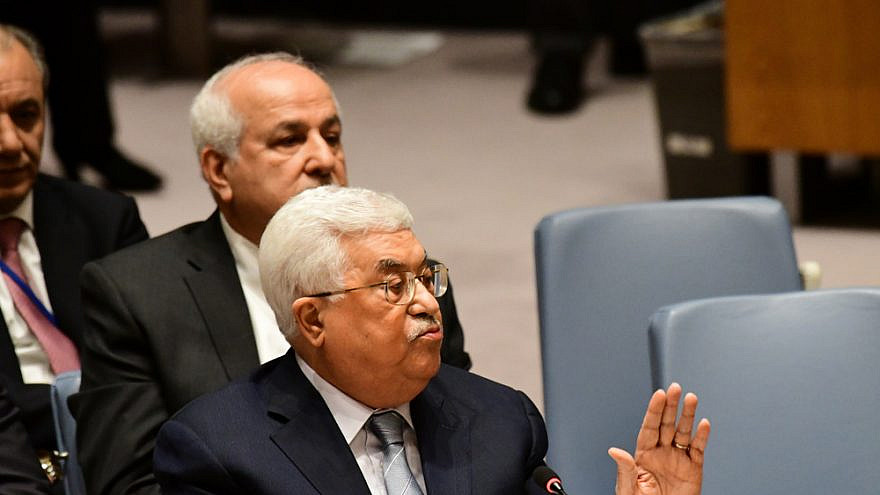Palestinian Authority leader Mahmoud Abbas may be facing serious challenges to his reign in Ramallah, but he’s having no trouble playing the powers-that-be in Washington. After four years of being called to task by the administration of former President Donald Trump, Abu Mazen (as he is familiarly known in the Middle East) is once again enjoying the upper hand.
Recent moves by the White House and State Department to “reset” relations with the P.A. by reversing decisions made by Trump haven’t come as a surprise. Prior to and upon his election, U.S. President Joe Biden announced that he would be cozying up to the Palestinians.
Using more diplomatic language, members of his team have reiterated America’s intention to “restore” relations with the Palestinians in a number of concrete ways. These include reopening the PLO office in Washington and a restoration of massive amounts of financial aid to the P.A. and the United Nations Relief and Works Agency for Palestine Refugees in the Near East (UNRWA).
Yet, just as no “goodwill gesture” aimed at reversing Trump’s policies vis-à-vis the Palestinians has been unexpected, neither has Abbas’s typically ungracious attitude. Unlike Trump’s people, however—who made it clear from the outset that the aging despot’s delusions of grandeur and posturing wouldn’t work on them—Biden’s are kissing up to him.
In mid-February, U.S. Secretary of State Antony Blinken personally phoned Abbas, undoubtedly to discuss all the goodies that the P.A. could anticipate from Biden & Co, and perhaps to wish him well in the upcoming elections. But rather than bask in the attention that he was receiving from America’s top diplomat, Abbas refused to take the call.
Yes, the head of the tiny terrorism-supporting entity was deeply offended that someone of Blinken’s “inferior” stature was on the line. Abbas, after all, had demanded that Biden himself initiate the conversation, “president to president.”
Instead of warning Abbas not to overestimate his standing in the world relative to that of the secretary of state, Blinken accepted the snub. According to a report on Thursday by Israel’s Kan 11 Radio, which was picked up by the Ma’ariv newspaper, sources in Ramallah and Washington are now discussing the option of Blinken’s holding the chat with P.A. Prime Minister Mohammad Shtayyeh or senior P.A. official Hussein al-Sheikh.
Palestinian affairs expert Khaled Abu Toameh confirmed the veracity of the report, informing JNS that Abbas had instructed his aides to tell Blinken to talk to P.A. Foreign Minister Riyad al-Maliki, the secretary of state’s “counterpart.”
Abbas’s gall is not new and has served the P.A. ruler well with the international community, which has elevated him to ill-deserved heights. This is due to an unfounded, knee-jerk opposition to Israel, not to the way in which he rules his own people, who view him with disdain and outrage.
Nor is American appeasement of petty tyrants a novelty; certainly not among those, like Biden and many of his appointees, who served under former President Barack Obama. Iranian Foreign Minister Mohammad Javad Zarif’s verbal abuse of former U.S. Secretary of State John Kerry during nuclear negotiations—so loud and disrespectful that even Supreme Leader Ayatollah Ali Khamenei ordered him to tone it down—comes to mind in this context.
Trump put a temporary stop to such supplication. Ramallah, like Tehran, responded by spewing rhetoric, but feared suffering the consequences of Washington’s wrath. One key basis for the trepidation was financial.
True, sanctions didn’t stop the P.A. from paying terrorists’ hefty salaries or prevent Iran from keeping its centrifuges spinning. The withholding of cash has, however, made life more difficult for both regimes.
Emboldened by the old sheriff’s posse being back in town, each has been testing Washington’s limits. So far, there don’t seem to be too many.
In fact, the Biden administration’s allocation of $90 million in aid to the P.A. ($15 million in “coronavirus relief” and another $75 million for the Palestinians to regain “trust” in the United States) comes weeks after Abbas rejected Blinken’s telephone overture. Talk about a return to Obama’s proud “leadership from behind.”
Whether Abbas and his governing Fatah faction survive the fast-approaching elections—slated for the Palestinian Legislative Council on May 22, for the P.A. presidency on July 31 and for the Palestinian National Council on Aug. 31—remains to be seen. Still, what’s already clear to him and any potential successor is the path to Uncle Sam’s purse and heart strings.
Ruthie Blum is an Israel-based journalist and author of “To Hell in a Handbasket: Carter, Obama, and the ‘Arab Spring.’ ”


























